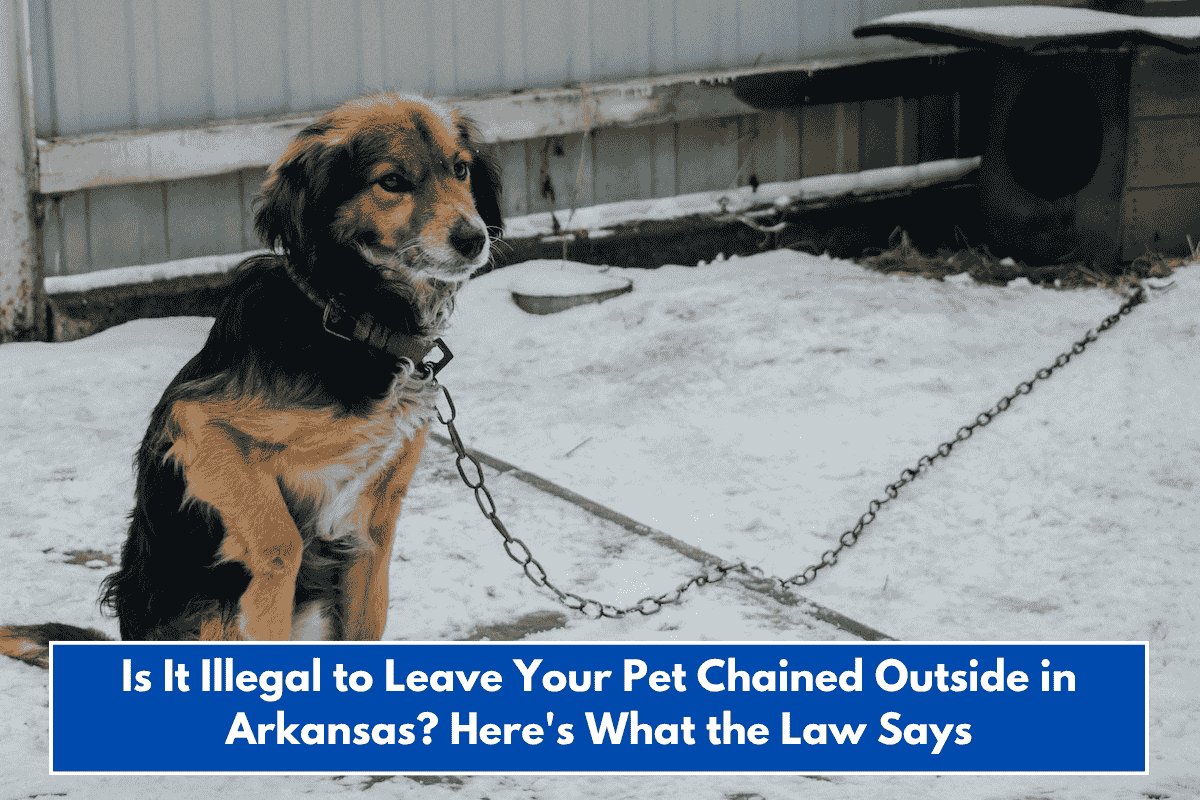In Arkansas, the issue of leaving pets chained outside has raised concerns about animal welfare. As a pet owner, it’s important to understand the state laws and regulations concerning the treatment of animals, especially when it comes to leaving them chained or tethered outdoors. In this guide, we will break down what the law says and the responsibilities that come with owning a pet in Arkansas.
The Legal Standing on Tethering Animals in Arkansas
Arkansas has specific laws in place designed to protect pets from abuse, including regulations regarding the tethering or chaining of animals. While there are no statewide laws that completely ban chaining pets outdoors, there are rules that ensure it is done safely and humanely.
- Tethering Limitations: Arkansas law requires that any animal that is tethered outside must be given a properly fitted harness or collar and must not be left in a situation that causes pain or suffering. This means that pets should not be left outside for prolonged periods in extreme weather conditions or without proper shelter, food, and water.
- Length of Time: The law stipulates that pets should not be left outside for extended periods in a way that could harm them. If an animal is tethered for long periods, there must be enough space for the animal to move freely and access basic needs like food and water. Additionally, pets should not be chained or tethered for more than 14 continuous hours in a 24-hour period.
Arkansas’ Anti-Tethering Law (2019)
In 2019, Arkansas passed Act 435 which specifically addresses the issue of tethering animals. This law established some important guidelines for responsible pet ownership, including:
- No Tethering in Extreme Weather: Animals should not be left outside if the temperature is below 32°F or above 90°F. During extreme weather conditions, like freezing cold or scorching heat, tethering an animal outside for any extended period could be considered abusive.
- Access to Shelter: Any animal tethered outside must have access to a shelter that protects them from the elements (rain, wind, sun, etc.). This shelter should provide adequate protection from both weather and any other external hazards.
Exceptions and Clarifications
- Temporary Tethering: There are exceptions to the law for temporary situations. For example, if a pet is being tethered for training, exercising, or another brief activity, this may not violate the law as long as the pet is not left unattended for long periods.
- Enforcement: If someone is found violating these laws, animal control officers and law enforcement can intervene, sometimes issuing fines or requiring that the animal be brought into proper care. Animal cruelty charges could also apply if the situation is deemed abusive.
Why It’s Important to Be Responsible
While the law provides certain guidelines for the humane treatment of animals, experts and animal advocates strongly urge pet owners to avoid leaving pets tethered outside for long periods of time, especially without human supervision. Tethering can lead to:
- Physical Injury: If pets are tethered too tightly or in unsafe conditions, they can suffer from physical injuries, including rope burns or being strangled.
- Mental and Emotional Stress: Dogs, especially, are social animals that need interaction and mental stimulation. Being left alone for long periods can lead to anxiety, aggression, and behavioral problems.
- Exposure to Weather and Hazards: Animals left outside in extreme weather conditions are at risk of hypothermia, heatstroke, or other weather-related injuries. They may also be more vulnerable to other dangers such as wildlife or traffic.
What Should You Do as a Responsible Pet Owner?
If you’re an Arkansas resident or planning to live there, here are some tips for responsibly caring for your pets:
- Never Leave Your Pet Unattended for Long Periods: If you need to tether your pet outside for any reason, make sure they are closely monitored. Avoid long periods of unattended tethering.
- Provide Shelter and Water: Always ensure that your pet has a proper shelter to protect them from harsh weather, as well as easy access to food and fresh water.
- Proper Training: If you need to tether your dog for training or exercise, consider doing it in a safe, controlled environment with plenty of supervision.
- Consider Alternatives: Instead of chaining or tethering your pet, consider safer alternatives like fenced yards or a leash when walking your dog. This gives them more space to move freely without restrictions.
While Arkansas law does not completely ban chaining pets outside, it does provide clear guidelines to ensure that animals are treated humanely. Tethering must be done responsibly, with appropriate shelter, food, and water provided, and pets should not be left outside in extreme weather conditions. As a pet owner, it’s important to follow these guidelines to prevent harm and promote the well-being of your animal. Always ensure that your pet has a safe, comfortable environment and is not left exposed to unnecessary risk.
SOURCES
[1] https://www.peta.org/issues/animal-companion-issues/ordinances/jonesboro-arkansas/
[2] https://www.hopearkansas.net/docview.aspx?docid=12139
[3] https://www.animallaw.info/topic/table-state-dog-tether-laws
[4] https://www.peta.org/issues/animal-companion-issues/ordinances/north-little-rock-arkansas/
[5] https://aldf.org/wp-content/uploads/2019/01/Animal-Protection-Laws-of-Arkansas-2018.pdf














